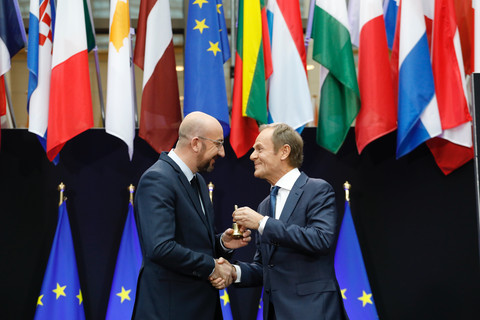[ad_1]

Central and eastern Europeans are continuously underrepresented in the EU’s leadership, which could “severely undermine support for the EU’s institutions, values and policies”, a new study by the consultancy European Democracy warns.
Western European countries continue to be dominant in EU leadership positions, a trend that has not changed significantly since the 2004 ‘Big Bang’ of enlargement with 10 new member states.
In the last 10 years, western Europe has continued to receive over 60 percent of appointments for EU institutions, the study found.
Countries of southern Europe come second, receiving around 25 percent of all leadership appointments, and are actually overrepresented in leadership positions compared to the region’s number of member states.
Northern European countries come in third, with around seven percent of total appointments and mandate durations (counted in number of days), but again exceed representation when compared to its population.
Central and eastern European countries have been “outliers” with each receiving around 2.5 percent of all appointments and two percent of mandate durations. In recent years their figures increased, but only from around five percent to seven percent of all appointments.
Central and eastern European appointments are concentrated mostly in the EU agencies – which are legally separate from the EU institutions and are aimed at accomplishing specific tasks, and have weaker political weight.
The study warns that the current composition of the EU’s top jobs (three western Europeans and two southern Europeans) “reflects the duopoly of western and southern Europe over EU institutions, for which they have received a combined 90 percent of appointments and 95 percent of mandate durations since 2004”.
Last July, when EU leaders decided on the top positions of the EU institutions, Bulgaria’s Sergei Stanishev, president of the Party of European Socialists, was discussed briefly as a possible president of the European Parliament, but Italy’s David Sassoli ultimately got the job.
In recent years, two Polish politicians have held top jobs in the EU, Jerzy Buzek as parliament president, and Donald Tusk, as president of the European Council.
‘Indefensible’
European Democracy Consulting said it does not advocate for an exact representation but adds that the continued under-representation, or “even just a feeling of lasting under-representation” will lead to frustration and will impact EU governance and cohesion.
It adds that four-out-of-five central European countries were also the four least-voting countries in the EU in the European elections in 2019.
While other factors also played a part, “it is clear that the absence of these countries from leadership positions is sure to further alienate their citizens from the Union,” the report added.
“With central and eastern Europe representing 40 percent of member states and 20 percent of the EU’s population, their almost complete absence from EU leadership positions becomes indefensible”, it adds.
Central European countries have not received a single leadership appointment for EU institutions (that is, the seven institutions defined in the EU treaties: the Commission, European Council, Council of the EU, Parliament, European Court of Justice, European Central Bank, Court of Auditors) or other bodies, almost only for EU agencies, the report found.
While the lack of internal experience might explain the low level of representation in the first years after the 2004 accession, central and European member states fare worse than countries in other regions following their own accession, the report added.
Western European dominance did decrease since the early 1990s, the report found, from close to 80 percent to over 60 percent, but that has mostly benefitted southern and northern European countries. The gains for eastern and central European counties remain “marginal”, the study said.
The report said the ultimate decision-makers, EU leaders and the EU Commission, should acknowledge the issue, and set goals and commit to targets for more equal representation.
The report surveys 72 entities, 89 positions, and close to 500 office-holders from 1952 to 2020.
It defines “northern Europe” as Sweden, Finland and Denmark, “western Europe” as Austria, Belgium, France, Germany, Ireland, the Netherlands, and the UK (until Brexit), “central Europe” as the Czech Republic, Slovakia, Hungary, Croatia and Slovenia, “eastern Europe” as Estonia, Latvia, Lithuania, Poland, Romania and Bulgaria, and “southern Europe” as Cyprus, Greece, Malta, Italy, Portugal, and Spain.
[ad_2]
Source link